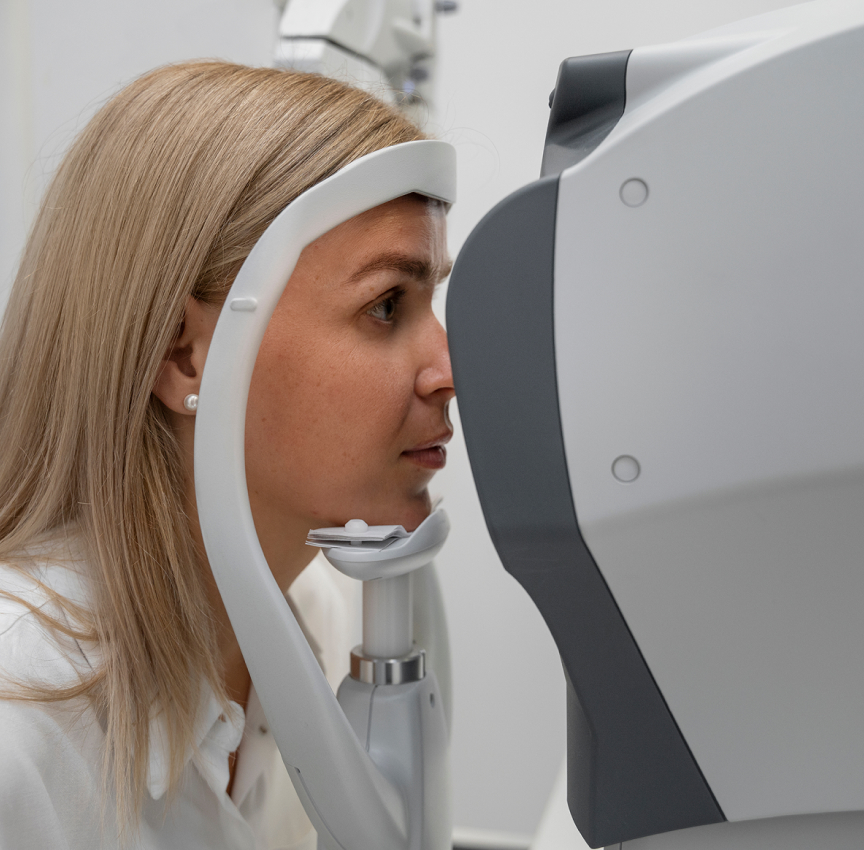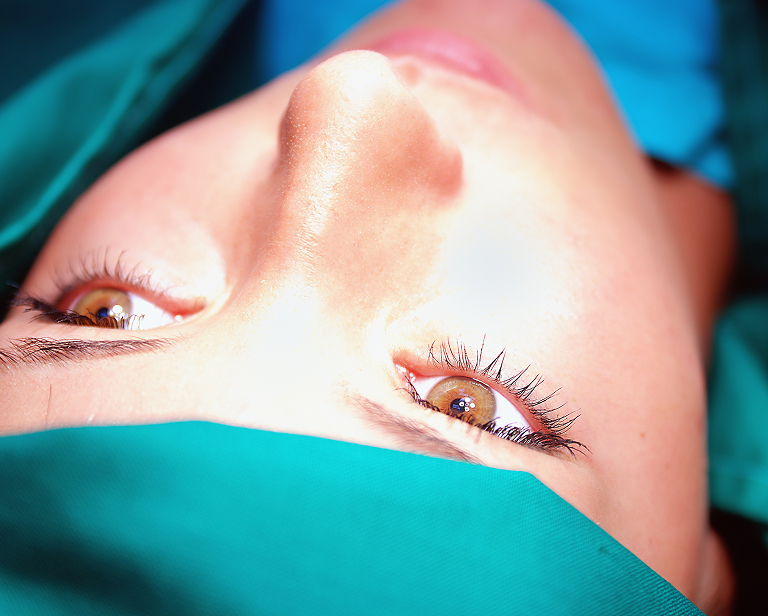



Transform Your Vision With Expert LASIK Eye Surgery or the Exciting New Evo ICL Surgery in Northwest Georgia
Professional Eye Associates is the region’s leader in LASIK eye surgery. Our certified LASIK surgeons offer the most advanced technique, Bladeless LASIK, which uses a femtosecond laser to create a stable and precise flap. With over 30 million successful surgeries worldwide, LASIK is by far the most popular, safe, and effective vision correction surgery for the treatment of nearsightedness, farsightedness, and astigmatism.
Our Professional Eye surgeons are also trained in PRK surgery, a similar, laser-based eye surgery that also treats nearsightedness, farsightedness, and astigmatism. We also offer the revolutionary Evo ICL implant for patients who do not qualify for LASIK or PRK surgery.
Our experienced, board-certified eye surgeons are dedicated to providing personalized care, ensuring the best outcomes for your vision needs. If you’re ready to enjoy seeing the world clearly without the hassle of glasses or contacts, schedule your LASIK, PRK, or Evo ICL consultation today!
What Is LASIK Eye Surgery?
Laser-assisted in situ keratomileusis, or LASIK, is a highly effective laser eye surgery that reshapes the cornea (the clear front part of the eye) so that light entering the eye is properly focused onto the retina, improving vision. It’s a quick, outpatient procedure with minimal recovery time, allowing most patients to return to normal activities within a day or two.
Imagine waking up and seeing the world clearly without reaching for your glasses or dealing with your contact lenses. LASIK’s benefits go beyond clearer vision–it allows for a more active, hassle-free lifestyle.


Am I a Candidate for LASIK?
If you have a common refractive error, including myopia (nearsightedness), hyperopia (farsightedness), or astigmatism, LASIK can help. This procedure can reduce or completely eliminate the need for glasses or contact lenses and give you the freedom of clear, unaided vision.
Patients that are good candidates for LASIK are adults with a stable vision prescription and healthy eyes. Healthy corneas are especially necessary for LASIK eye surgery. Adults with thin corneas or dry eyes may not be a candidate for LASIK.


What You Need To Know About LASIK, PRK and Evo ICL Eye Surgery
What Are My Options if I Don’t Qualify for LASIK?
Some patients aren’t candidates for LASIK eye surgery. Professional Eye Associates offers two additional eye surgery options for those patients. One option is photorefractive keratectomy, or PRK eye surgery, which is a similar procedure to LASIK that may be more suited to patients who don’t meet LASIK criteria.
An alternative to LASIK and PRK eye surgery is the Evo ICL implant. This modern alternative to laser eye surgery involves placing a custom lens inside the eye (behind your iris and in front of your natural lens) to correct nearsightedness and astigmatism. ICL surgery is ideal for patients with thin corneas, dry eyes, or severe refractive errors. The procedure is minimally invasive and reversible.
Knowing what to expect with LASIK, PRK, or Evo ICL eye surgery can help you feel more comfortable and confident about the procedure. Here’s what will happen before your procedure:
Consultation and Evaluation
Your journey begins with a LASIK, PRK, or Evo ICL consultation to determine which procedure is right for you and if you are a good candidate for eye surgery. During this appointment, we’ll perform vision assessments, review your vision and medical history, and discuss your vision goals and expectations. Before your consultation, please stop wearing your contact lenses for at least two weeks. This will help your cornea return to its natural shape.
Medical Tests
Our comprehensive vision tests include corneal topography and corneal tomography, which analyzes the front and back corneal surfaces, corneal thickness, and curvature analysis. We will also perform the Schirmer’s test, which looks for dry eyes. Combined with industry standard measurements and analysis, this will allow us to evaluate whether LASIK is the right solution for you, or if PRK or Evo ICL surgery would be a better fit.
What Happens During Eye Surgery?
Our goal is to ensure you feel comfortable and informed on the day of your procedure at Professional Eye Associates.
Preparing for Surgery
Before your eye surgery, stop wearing your contact lenses for at least two weeks. This will help your cornea return to its natural shape.
The day of your procedure, avoid wearing eye makeup, creams, lotions, or perfumes. Arrange transportation after your appointment, as your vision will likely be blurry and you may still be experiencing the effects of sedatives used during the surgery.
Here’s what you can expect during your procedure:
Local Anesthesia
You’ll receive numbing eye drops to keep your eyes comfortable during the procedure. You may also choose to have a mild sedative to keep you relaxed during the surgery.
The Procedure
Both LASIK and PRK generally take 10-15 minutes per eye, but we suggest you allow approximately 2 hours for the entire process.
What To Expect After Eye Surgery
Almost immediately after your procedure, you’ll be able to go home and rest. Initially, your vision may be blurry, and you may experience mild discomfort for the first few hours. After LASIK or Evo ICL eye surgery, most people are able to resume their regular activities, including work, the day after the procedure. Recovery times for PRK eye surgery are slightly longer, with about 3-5 days of healing necessary before vision begins to clear.
Post-Operative Care
To ensure proper healing and the best results, use the eye drops and/or medication given to you, and follow your doctor’s post-op care instructions closely to prevent infection and reduce inflammation. An eye shield will be placed over your eyes following the procedure. This protective measure is typically worn for the first 24 hours after the procedure, and then at bedtime for several days. Avoid rubbing your eyes and strenuous activities for at least a week.
Expected Results
With LASIK or Evo ICL surgery, most patients notice significantly clearer vision within 24-48 hours, with full stabilization occurring over the next few weeks. While perfect 20/20 vision is not guaranteed, most patients enjoy significantly improved vision and a reduced need for glasses or contacts. With PRK surgery, most patients see more clearly after 3-5 days, but may take longer depending on the patient.
Are There Risks Associated with Eye Surgery?
Although eye surgery is generally safe and effective, like any surgical procedure, it does come with potential risks. Understanding these can help you make an informed decision about your next steps.
Common Risks
Patients often experience mild, common side effects that improve over time, including dry eyes, a glare or halos around lights (especially at night), and temporary vision fluctuations.
Serious Complications
The more serious complications are rare, affecting fewer than 1% of patients. These could include infection, overcorrection or undercorrection of vision, or other complications (such as improper healing).
Reducing the Risks of Eye Surgery
To mitigate risks, choose an experienced, board-certified surgeon like those at Professional Eye Associates. Our expert team uses the latest technology and comprehensive exams to prioritize safety and precision.
When To Seek Help
If you experience severe pain, vision loss, or persistent discomfort, contact your surgeon immediately for prompt care. Rest assured that LASIK, Evo ICL, and PRK complications are very rare. In fact, to date, there have been no reported cases of blindness due to LASIK.


Ready for Clear Vision? Schedule Your Eye Surgery Consultation With Us Today!
Our eye surgeons at Professional Eye Associates can’t wait to help you enjoy the freedom of clear vision without the need for glasses or contacts. Our four convenient locations in Dalton, Calhoun, Ft. Oglethorpe, and Chatsworth allow you to enjoy the convenience of world-class eye care right in your community.
Take the first step towards clear, hassle-free vision by scheduling your LASIK, PRK, or Evo ICL consultation today and discover why so many patients trust Professional Eye Associates for their eye care needs.